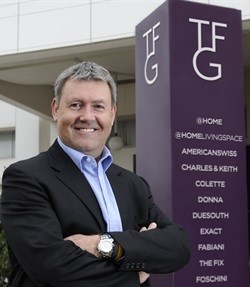





Results highlights
• Group turnover up 11.6% (constant currency +14.3%) to R23.5 billion (TFG Africa*: +8.0%)
• Headline earnings grew 10.1%, (6.8% excluding acquisition costs)
• Headline earnings per share excluding acquisition costs up 4.1% (constant currency +5.7%) to 1 099.2 cents
• Final dividend of 400.0 cents per share, total dividend of 720.0 cents per share – a 4.2% increase
• Total cash component of turnover 60.7% (TFG Africa: 51.1%)
• Strong cash turnover growth of 18.5% (TFG Africa: 14.1%)
• Net bad debt reduces by 5.4%
• Free cash flow doubles to R1.3 billion
• Acquisition of 400-outlet leading Australian menswear retailer, the Retail Apparel group (RAG), post year-end
* TFG Africa includes all operations on the African continent

“We are pleased with these results and with our international acquisitions. While cost control remains a priority and key focus area, we will continue to invest for future growth,” says CEO Doug Murray.
Performance within the international division has been ahead of expectation and peer group performance, with good progress made on the strategic targets set for upmarket brands Phase Eight and Whistles. Turnover growth was 45.0% in GBP and operational EBITDA (earnings before interest, taxes, depreciation and amortisation) growth 15.1% in GBP.
The group plans to open more than 110 international outlets in the current financial year. It also proposes 150 new African stores in the same period, which will increase trading space by some 5%.
During the past year, the group opened 331 outlets (206 in Africa and 125 internationally). It closed 128 outlets as part of its ongoing capital optimisation project, converting 37 of these to other group brands. Net trading space in African operations has grown by 4.4% since March 2016.
At the year-end, the group traded out of 183 outlets across seven African countries (excluding South Africa). During the year, it opened nine outlets and closed two (Africa excluding South Africa). These traded satisfactorily with turnover growth of 9.9% during the year and comparable store turnover growth of 3.4%.
In South Africa, 160 new outlets were opened during the year and 37 former Fashion Express outlets converted to other brands in the group, bringing the total number of South African outlets to 2,406.
Investment in e-commerce continues, with turnover from online trading exceeding expectations for both local and international brands. Shortly after year-end, @homelivingspace launched online furniture sales. Eleven brands are now available online.
Turnover growth for TFG Africa (all operations on the African continent) was 8.0% for the financial year, with comparable sales growth of 2.8%.
Cash turnover growth for the group was slower in the second half at 9.5% (TFG Africa: 10.3%) resulting in full year growth of 18.5% (TFG Africa: 14.1%). Credit turnover grew by only 2.3%, impacted by fewer new account openings because of the Affordability Regulations.
The group achieved a gross margin of 49.7% (March 2016: 49.7%) for the year, while TFG Africa was 46.4% (March 2016: 46.9%), impacted by strong, lower margin, cellular sales (+ 15.3%).
Total trading expenses increased by 12.8% (TFG Africa: 7.9%) over the previous year. The total expense growth is non-comp due to the inclusion of Whistles this year.
The retail debtors’ book of R7 billion grew by 4.6% compared to March 2016. The Affordability Regulations and the challenging economic environment have severely affected the number of active accounts, which reduced by 5.4% compared to the previous year.
Net bad debt decreased by 5.4%, due to improved collection results and strong growth in recoveries. Because of the modest growth of the debtors’ book and the lower credit turnover growth, net bad debt as a percentage of the closing debtors’ book was 11.3%, down from 12.3% at March 2016. The retail debtors’ book is conservatively provisioned at 11.8%, down from 13.2% at the previous year-end.
Murray says he remains confident about the future, despite political and economic uncertainty and the impact of the Affordability Regulations.
“Our continued commitment to our strategic objectives around customer, leadership, profit and growth will support our future success. Our investment in the UK and Australian markets strengthens our diversified portfolio of brands and provides a solid platform for further growth opportunities in these markets.”
The group’s turnover growth, in constant currency, for the first seven weeks of the 2018 financial year, is in line with management’s expectations in the upper single digits across both TFG International and TFG Africa.